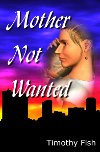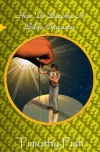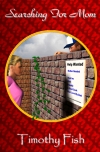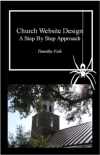
And Thy House
Extra Feature: High Res Image

History of
Cane Creek
Association
by D. F. Magruder
How to Write Bad Novels
Written By: Timothy Fish Published: 12/4/2007
Most authors who submit manuscripts to agents or editors and have them rejected have a bad manuscript, or so I have heard from one agent. I have no reason to doubt this. There is an awful lot of junk out there and even among the things that have made it past the agents, past the publisherís review boards, past the editors, and onto the store shelves, there is an awful lot of stuff that I do not care to read. The question we may ask ourselves is what is it that distinguishes a good manuscript from a bad manuscript?
When it comes to work submitted an editor or an agent, the answer is quite simple. If the editor or agent likes it then it is good, but if the editor or agent doesnít like it then it is bad. Now, most editors and agents will probably disagree with me on that. They are more likely to come up with several different reasons why they donít like that particular manuscript and they may be correct in their assessment, but that doesnít explain why there are so many boring stories making it through the process.
What an author wants to be able to do is to write that wonderful story that everyone wants to read, that story that everyone talks about and encourages his or her friends to go read. Most authors would settle for a story that brings in enough money to pay for the time they have spent on it. Toward that goal they often try to determine what will look for those things that make a story extra special. Sometimes, the best way to understand how to do something is to understand how not to do it. To understand how to do the best, we must be able to recognize the worst. Letís look at what it takes to write the absolutely worst book possible.
A Bad Topic
The first thing you can do when writing the worst book possible is to pick a topic that no one else cares about. There are plenty to choose from. Right at the top of the list is your own life story. Unless you are a well known individual who has accomplished great things and people come to you, wanting to know how they can do the same, no one wants to read your life story. So, the worse book possible may be an autobiography. It really doesnít matter how awful your parents were, or how many times you had to move or how bad your life has been, most people have heard similar stories and they donít care. Life is hard for everyone, so your life isnít unique, so it will make an excellent boring topic.
Some people arenít so lucky. Some people have achieved a level of fame and people really do want to read their life story. When this is the case, the author must choose a different topic in order to write the worst book possible. Possible topics might be the authorís grandkids, the authorís pets or anything or anyone else who the author knows, but his audience does not. The goal here is to find a topic that is completely meaningless to the audience. If the audience has never heard of the topic and there is no clear way that the audience can apply what they might learn about the topic to their own lives then it is an excellent topic for our purposes.
If you canít seem to come up with another bad topic, just pick a topic that is on the New York Times best seller list at the moment. While the topic itself may not be bad, by the time you finish the book and make it available to the reader, the reader will be so tired of hearing about the topic that it will seem like a terrible topic.
Use Fancy Language
The propensity of authors to bombard the partakers of reading enjoyment with numerous language units of thesaurical origination greatly enhances our ability to culminate our quest for the more horrendous combination of bound pages possible. Trust me, if you want to write a bad book, learn the thesaurus backwards and forwards. You must be careful, since sometimes you can use the thesaurus to find just the right word. In writing a bad book, our goal is to use language that is so contrived that the reader has to ponder the meaning of each phrase before he can move on.
Using fancy language is an excellent way to create a disconnect between the reader and the story or between the reader and the author. It is not enough to know more about the subject than the reader does. The reader expects the author to know more about the subject or he wouldnít be reading the book. The purpose of using fancy language is the rub the readerís face in how truly stupid he is compared to the intelligence of the author.
Life on a Silver Platter
This applies mainly to fiction, but one of the best ways to write an awful novel is to hand life to your character on a silver platter. Perhaps the character lives in an ideal world. Everyone is happy. There is no crime. Everyone is rich. No one dies or becomes sick. The character is a prince or a princess and is going to marry the prettiest girl or the most handsome man in the kingdom. Nothing could be better and nothing will work better toward reaching our goal of writing the absolutely worst book possible.
Now, we do want something of a plot in our terrible book, so we may scale back on how well we treat our characters. We want them to have problems that they face. Without problems, our book will not reach the page count we need. We can still achieve a terrible book. The best way to do this is to give our characters problems or give the friends of our characters problems, but we also give the characters the wisdom they need to be able to handle the problem. For example, a characterís mother might be diagnosed with cancer, to which the character says, ďI know this is the will of God and I must accept it.Ē Problem occurred, problem solved, now letís get on with exploring the ideal world in the novel.
Characters No One Cares About
When righting terrible fiction, the last thing you want is a character that people have an emotional attachment to. You might even try writing the story without any real characters at all. Tell what happened, but donít tell the reader who or what did it. Let the reader figure it out you might use the following paragraph as an example of how to write in this way:
The sound of chimes was heard in the hallway. A shadow could be seen on the wall. The creak of a door was heard. A woman was seen on the bed and white sheets were seen covering her. A knife was raised into the air. The knife was brought quickly down. Blood could be seen on the white sheets. The creak of the door was heard, then the sound a man running.
You will notice how little the reader is told in this paragraph. Someone heard chimes. Who? We know that a woman was on the bed. We donít know who it was. We know there was a man involved. Did the man use the knife to kill the woman? Maybe. Did the woman use the knife to protect herself from the man? Maybe. We have left it for the reader to guess and that was our goal. There are many things that might have happened, but it is not made clear by the paragraph. Even though this may have been a very exciting scene, the reader probably doesnít care what happened to whom. This is a very effective way of writing bad fiction.
Begin Before the Beginning or After the Ending
A sure way to write a bad story is to begin too soon or too late. The way to begin too soon is to give the reader more of the background story than he needs to know. Writing a story about a widower who is considering remarriage? Why not start the story with his courtship before the first marriage? Over even better, start the story at the manís birth or the birth of his father. Doing this will add a bunch of filler to the story and the reader will become bored before reaching the interesting bits. Ideally, we wonít have any interesting scenes, but if we do then the boring parts at the first will lull the reader to sleep and he will not notice that we have inadvertently made part of the story interesting.
Another way to write bad fiction is to begin the story after the problems are resolved. This should not be confused with beginning the story at the end and then going back and telling the reader what happened. In writing bad fiction, what we want to do is to begin at the end, preferably with a happily ever after ending and then move forward like there is something interesting that might happen, even though we know it wonít. This really works well when we latch onto someone elseís story and continue it as if it is our own. What happened to Cinderella after the glass slipper fit? Nothing interesting. The lived happily ever after. That is why this technique is so effective for creating bad fiction.
Create a Weak Middle
Having a weak beginning or a weak end is helpful in creating bad fiction, but they are nothing when compared to the effectiveness of having a weak middle. A strong beginning hooks the reader, but they soon forget it. A strong ending only works if they make it that far. With a weak middle, we can assure that the reader will forget the beginning and will never reach the end.
One way to create a weak middle is to start with a problem and solve it too soon or fail to solve it soon enough. Books are like power lines. When a problem is introduced it is like hanging the line on one pole and the resolution is like hanging it on another pole. If we stretch the line tight enough, we can keep it from dragging the ground between the two poles, or we can add additional poles in the middle.
Imagine a situation in which the problem is introduced at the beginning of the book and the resolution takes place at the end. In this situation, the surest way to create our desired weak middle is to avoid all tension related to solving the problem, but how can we do that? Maybe the problem is that the characterís house has burned to the ground and the character needs a new home. The resolution to this problem might be that the character moves into a new house. To reduce tension, we might give the character a rich uncle who happens to have a vacation home near where the character lives. He calls up our character and tells her that she is welcome to stay there and that he is going to build her a new house, exactly like the one that burned down, on her property. It will take until the end of the book for her to move in, but by providing the reader with enough information to see the end we have removed all tension from the story. The rest of the book can be filled with a useless storyline that has nothing to do with anything of interest.
Another way to create a weak middle is to follow a step-by-step progression from the initial problem to the resolution. If there are enough steps then there will be plenty of things to increase the page count, but we can still weaken the middle by removing any obstacles that the character might face in achieving each step. Making it difficult for our characters creates undesired tension in the story. If we make it easy for the characters to accomplish each step then the reader will be able to see how the final solution will be resolved and will be bored to tears, like we want him to be.
One thing we must be careful about when creating a weak middle is the interaction between characters. When characters have opposing goals it tends to create tension within the story. If you think of this as having a hero and a villain, the hero might be trying to pull the story toward his goal and the villain might be trying to pull the story in the opposite direction. We assume that one or the other will accomplish his goal, but when it appears that the other character is strong enough to accomplish his own goal there is a lot of tension. One way to remove this tension is to make one of the characters so weak that there is no way for him to accomplish his goal. When the other character attempts to reach his goal, the weaker character just yields and lets him have it.
In theory, the story would be even worse if we had the stronger character yield to the weaker, but there really is no way of knowing who the stronger character is except by his actions. When a character yields to other character rather than trying to reach his own goal, the character is demonstrating that he is the weaker character, so the weaker character is always the character who does not accomplish his goal.
The absolute best weak middle for our purposes may be one where the characters are so weak that they are unable to accomplish their goals even without opposition. In other words, they really donít do anything in the middle. There is a problem at the beginning and a resolution at the end, but the characters have no part in bringing about the resolution. Their whole purpose is to sit there and do nothing important until someone else comes along and solves the problem.
Use Unexplained Magic
Another thing that we can do to make our story as bad as we possibly can is to cause things to happen that do not seem plausible. In fiction, there are a great many things that can be made to look plausible. Space travel, time travel, talking animals and flying reindeer are all plausible in the proper circumstances, so it takes more than just dropping a miracle into a story to make a story bad. Usually, implausibility involves taking the easy way out of the story.
Consider the story of Cinderella. We all remember how her fairy godmother used magic to make it possible for her to attend the ball, but at midnight, the magic stopped. Why did it stop at midnight? Why didnít her fairy godmother just make the prince fall madly in love with her and come riding out to find her? Because even with magic it is implausible that characters will not have to face problems that they need to resolve.
So, if we want to write bad fiction, the way to do it is to use
unexpected things to solve the characterís problems. We see this frequently in movies.
To use these unexplained coincidences effectively in creating a bad story, we need to use them to get the character out of predicaments throughout the story. Rather than allowing the reader to see how the character will handle each predicament, we can throw in something to provide an escape for the character. If in A Little Princess, Saraís father had died, leaving her penniless, and rather than being banished to the attic and being forced to scrub floors her friendís parents had come to her aid and provided enough money to keep her in the status she had held before then the story would have been ruined and we would not be able to see that her character was consistent, no matter what level of wealth she had.
When trying to make something as implausible as possible, bring the character up to the door of a problem and then make the problem disappear as if it is not important or create a problem and then reverse the situation. One possibility is to tell a story in which a bunch of people die and then have someone wake up and realize that it was all a dream. You might have someone drive off of a cliff and then a gust of wind (which hasnít been explained as being part of a fanciful world) can be used to provide a soft landing for the car.
Even in worlds like the one we find in Lord of the Rings, the abnormal can be used to create a bad book if we are careful that we do not explain it away. We have come to expect that magicians can work magic, so if there is a magician in a scene then we are not surprised if magic happens. To use it to ruin a book, we can state earlier that humans are unable to use magic, then at a critical point in the story, where the reader is unsure how anyone can get out of the situation, we have a human use magic to get out of it, then we donít explain why he was able to do this when we already said that he couldnít.
Write to Please Everyone
Writing to please everyone who might read our work is a good way to create a bad book. To do this, we need to write very generically. Avoid humor at all costs. Humor is one of those things that some people will get and others wonít. It is impossible to please everyone if you use humor. We should not conclude that every humorless book is a bad book, but every book that is designed to please everyone must be written without the slightest smile appearing on the authorís face. If he feels even the slightest tendency of his mouth to curl up on either side then he should throw out his work and begin again because he has probably offended someone with what he has said.
Avoid controversial topics. Stick with topics that people will never disagree with. The sky is blue. The ocean is wet. If you choose to write about any topic that is not a proven fact you may offend someone. Even some topics that should not be debatable are openly debated by ignorant people, so this is one of the harder things to accomplish in our efforts to write a bad book.
Take No Action
Perfection, when it comes to writing bad fiction, requires a novel to be completely devoid of action. Action is writing is often very different than what we find in movies. In a movie, action involves car chases and exploding buildings. In writing, action may occur completely in a characterís mind, but one thing is require and that is that the character do something. In good fiction, the character is trying to move toward the goal. In bad fiction, the character isnít doing much or is doing nothing at all. No effort is being made to reach the goal, the reader keeps hoping that the character will do something toward that endeavor, but the character seemly flits around doing nothing, much like a person walking through a garden looking at the flowers when he should be working.
More Stuff to Do
If your goal is to write the very worst novel that you can possibly write, there are many other things that you can do, so be creative in your efforts. You might, for example, write the whole thing in pig Latin, Klingon or some other language that is not your native tongue. You could pick random words from the dictionary and try to work them into your book. Just because I have not mentioned it here does not mean that it cannot be used to write a bad novel. But I hope this helps you to understand what bad writing is. I would also love to hear your thoughts on the subject, so please comment if you feel so inclined.
www.timothyfish.com



